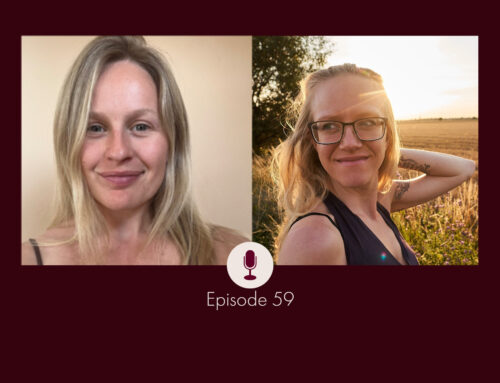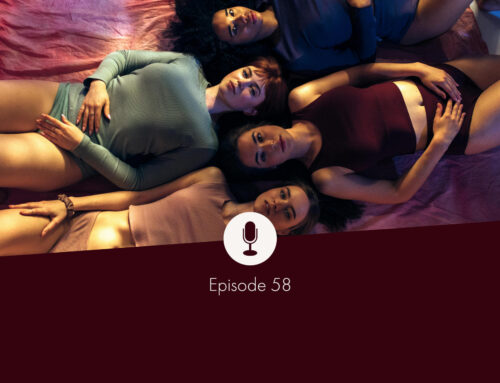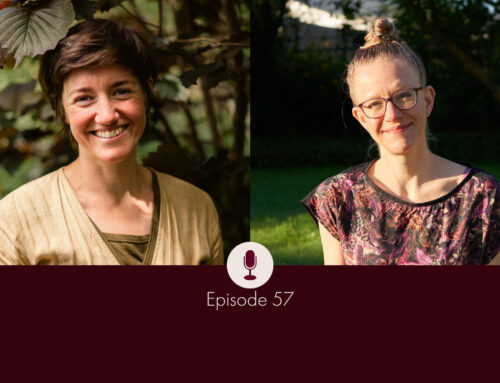Ixchel Lunar and I want to raise awareness about how the systems and structures we live in are heavily impacting our relationship to time and to the body, and how the pace of life is a social construct that works against us in so many different ways.
Subscribe on your favourite podcasting platform:
Apple Podcasts | Spotify | Google Podcasts | Amazon Music
Warning:
The episodes of this four-part series are potentially activating to your nervous system, so please make sure that you are in a good space to absorb the information and have a soothing practice at hand that you can turn to, should your nervous system be activated!
We live in systems that aren’t set up for our benefit, but seek to separate us from ourselves, each other and the land we live on, so we extract from and exploit the Earth and our own bodies for other people’s gain. Ixchel Lunar and I want to raise awareness about how these systems and structures have really impacted our experience and perspective of time, and how the pace of life is a social construct that works against us in so many different ways.
In today’s episode we specifically address ways to decolonize time, soothe the nervous system and build resilience in the face of the chaos the world is in right now. We dive into:
- What the act of decolonization means and encompasses
- That decolonization is a process that we are part of, but not solely responsible for
- What the land-back movement is and how it helps indigenous people to restore the relationship with the lands they originally tended
- How to start building a relationship to land and place when you live in the city
- The importance of co-regulation and befriending time to get us from fight-or-flight to a rest-and-digest state
- How food and activities that are connected to our people are very powerful ways to really connect into our resilience and the seasons
Resources we mentioned:
The introductory episode to this series (available on Spotify, Apple podcast, Google Podcast and Amazon Music)
The books on rethinking about the “wild and untamed” lands:
“Braiding Sweetgrass” by Robin Wall Kimmerer
“Tending the Wild – Native American Knowledge and the Management of California’s Natural Resources” by M. Kat Anderson”
“Fresh Banana Leaves: Healing Indigenous Landscapes through Indigenous Science” by Jessica Hernandez
Subscribe to Ixchel’s Dragon Letters on their homepage.
Subscribe to Mo(o)nday Musings to start each week more fully connected to yourself and your amazing body.
If you want to learn how to start communicating with your body, take my free Cycle Charting course here.
And if you experience menstrual health conditions like painful periods, PMS/PMDD, endometriosis, PCOS, irregular cycles, know that as a Menstrual Health Coach I help you address them in a natural and holistic way at their root cause (so without surgery or hormones), for a happy healthy bleeding experience. If you want to take your menstrual health into your own hands, book a call and let’s chat or send me an email, if you prefer a written conversation.
And today’s episode is going to be all about decolonizing time, which is mainly Ixchel’s body of work and I’m super excited to dive into that. To learn more about Ixchel and the whole series, we’ve recorded an introductory episode, so you can just look that up and listen to the last episode.
Just as a heads up, the content that we are talking about today is potentially triggering or, activating for your nervous system, let’s say. So make sure that you are in a grounded place and you’ve got something, some kind of tool, some kind of practice that you can use to pause and soothe your nervous system in between if things become a little overwhelming and you experience intense or difficult emotions.
That could be you gently stroking your skin because we’ve got nerve endings there, that can signal safety to the brain, when gently caressed. That can be taking a few deep breaths or getting outside, getting your feet on the ground. And we’ve shared a little bit about this, Ixchel and I, on the last episode, of how you can soothe your nervous system. So feel free to do that whenever you need.
And then let’s dive right in. After talking about colonized time and how time has been colonized in our last episode, Ixchel, maybe would you like to elaborate a bit on what decolonizing or decolonization actually means and how we can decolonize time?
[00:02:45] Ixchel: Yeah, I try to make it really simple. There are many layers to decolonization and, you know, at the root of decolonization is that land back movement for the people who’ve lost their connection to the land. Their land has been stolen from them, many indigenous cultures throughout the Western Hemisphere lack access to their original relationship with the land and have been placed on reservations, really still living in what some would say are concentration camps.And so, you know, much of especially North America and what we’re learning now about the Amazon is that folks were living and creating these food forests all over in the places that they would migrate to for certain types of food throughout the year, certain types of resources or animal migrations that they would follow for the ability to clothe and feed themselves.
And in some ways, we have really, in the colonial mindset, lost the view of that relationship with the land. And it’s like, it’s somehow wild and untamed, but really, many of the lands that the indigenous people lived on throughout the world are quite tended to and cared for and created in ways that are extremely productive and just full of life and food and all of that.
And it’s something that I noticed living in Nicaragua in the jungle. The jungle is just, there’s a life force in the jungle, that is just unstoppable. Like, you know, in the Mayan ruins that they keep finding throughout the world, they’re covered by these jungles that, you know, they may have left a region because it was no longer habitable or there was droughts and things that happened. And within a dozen or 20 years, some of these places get completely covered over. And you just lose them to time.
And it was just something that I noticed about some of these places, that the food was just so plentiful, that you would never go without food. And there would always be some kind of fruit, a tree, something that was producing, that was edible, that could be eaten. And if anyone’s interested in those kinds of concepts, there’s some great books about the way that the lands were cared for. And we can include those in the show notes as well.
[00:05:44] Lisa: Yes, please. [00:05:46] Ixchel: Yeah, really beautiful. You know, really trying shift our mindset that, you know, these lands were somehow untouched. And so that’s one way to start to decolonize the way that we see the world around us.And at the root of that, and the way that I like to really simplify the act of decolonization, is to come in relationship with. So in repair and relationship with the world around us. In the colonial mindset, it’s that separation and that domination of the land of people, of the cosmos. And so being able to just at the very simple place, see the decolonial project as one of repair and relationship, repairing our relationship with our bodies, repairing our relationship with the world around us, and with people and with the cosmos.
And so that can take a bit of the sting out of the concept of decolonization. You know, I think I mentioned last time, it took us approximately 600 years to get to where we are. And it’s going to take us several hundred years to really make these paradigm shifts in the way that we view and experience the world and are in relationship with the world around us. And so we’re just sort of planting these seeds.
And the idea of land back, you know, most people think in terms of that binary of either or. And in that way of thinking, it’s like, either I have the land or the indigenous do, right? It’s this either or. We can’t both have it and that sort of thing. And so some people start to freak out that somehow they’re supposed to give up their home and give up their community and leave a city or a country or that sort of thing.
[00:07:55] Lisa: And if I may jump in, it’s almost like this idea of I “have” the land or they “have” the land, to own, which is also a very colonial mindset, because what the natives did is stewarding the land. [00:08:11] Right. Exactly. Yeah. And so there’s, you know, there’s there’s a number of indigenous tribes in Northern California and in the Midwest, I believe, as well, that had started to ask people to basically tax themselves as a way of reparations. Like if you physically own a piece of land, to consider taxing yourself and giving that to a local tribe so that they can maybe potentially buy some acreage and start to be able to repopulate the land themselves.So there’s processes like that. And then there’s also, in the same way, that people will entrust their land to a land preserve to be able to, especially if you have large quantities of acreage, people in the United States at least have entrusted that into preserves, to try to preserve the land itself. Typically, those kinds of preserves are limited to the the natural wildlife that’s on the land and not necessarily people. But there are organizations that are indigenous trusts that are also accepting land grants as well from people that want to, you know, put that in their will and make that available.
So there’s different ways that land back happens. And, you know, I think many cities are exploring ways of working with the indigenous populations around, especially in places that have been significantly impacted by fire, for instance. Because the lands were cared for in a particular way by the indigenous for thousands of years, that prevented the kinds of fires that we see.
And being able to work with people with that really deep knowledge and wisdom about how to care for the land has been something that cities are potentially looking to do in order to, you know, prevent and also recover from some of these really devastating fires that we’ve seen. Some of that may be irreversible in terms of the climate change that’s happened and the lack of moisture that’s in the soil and how that’s impacting forests and whatnot. But there are some things that can be done to hopefully prevent those kinds of things.
So there’s this shift in the way that we start to view the world as being in relationship with both place and people and time itself. And so the work that I do around decolonizing time really starts with where we are. One of the things that I have found many indigenous cultures talk about is how time is very hyper local and that time feels different and pace feels different depending upon where we are on the planet.
And I think that’s really interesting and fascinating. And people will start to think, “Oh, yeah, I’ve traveled here and I’ve traveled there and there’s definitely a different characteristic, a vibe, a feeling that exists in one place versus another.” And I think at the root of that is really starting to get that sense, that feeling for where you are and how it is different and really starting to see time as an entity and as a friend and as a person, you know.
We see all of our friends differently. You know, they all have different characteristics and ways of being. And so that can also sort of start to settle the nervous system in this repair work and really get us to a place of being more centered and starting to use our senses in ways that could connect us to where we are more deeply.
[00:12:26] Lisa: Yeah, that is so cool. This idea of, well, of course we have friends that have different shapes and sizes and personalities. So why wouldn’t time have different shapes and sizes and personalities in different spaces? Amazing.And so, we’ve talked a lot about decolonizing space. Where do we start? I mean, it’s definitely intricately connected to time as well, as you just mentioned. And I’m thinking of someone who lives in the city somewhere, in what we call modern life. How can they start doing this work when it’s maybe even difficult to get to the land and get the connection to the land they’re on?
[00:13:15] Ixchel: Yeah. And again, starting to work with the idea of moving beyond the binary, that we really feel that we’re separate from nature when we’re in the concrete jungle. And to remind ourselves that the elements are all around us, right? The seasons and the elements are happening, whether we’re in the forest or a concrete jungle.And so to really start to be able to connect with the elements and where you are, depending upon the person, maybe they live in a multi-dwelling building that may not be a high rise, but maybe it has several apartments or something. There’s generally going to be a small piece of land somewhere on that property where you can start to get connected.
Maybe you can sit there, find a sit spot, and somewhere that feels really good for you. That will help your nervous system to be able to start to settle in and start to see the world around you from a very grounded and centered place. And being able to start to do that on a regular basis, this observation piece is really important as you are able to start to see what all is happening all around you in the world and start to maybe make connections.
Maybe there’s a tree nearby or there’s a mountain peak in the distance. Or if you do live in a high rise and all you can see is just a sliver of the sky, just being able to pay attention to the way that maybe the clouds move through and the light over the season starts to shift in the way that it shines on the buildings around you.
And the way that maybe some days there are these really glorious sunsets and other days the sky is really glass. It’s very still. There’s nothing really happening. But maybe there are shifts in the way that the blue looks in the sky and that sort of thing. So those are the kinds of ways that you can start to get connected with the seasons and the rhythms and the way that things are happening.
And then additionally, as you’re sitting there in your sit spot, hopefully if you’re outside for the majority of the year, I know some of us experience really intense seasons and so the weather may be a little unforgiving. But to be able to start to notice just the pace of life around you and the way that people are moving through the world, then you’ll start to see patterns in the way that some of these things are happening. And you’ll start to get a sense of the way that the energy of time is moving through that area and you’ll get a sense to the seasons and the way the seasons ebb and flow and different changes happen through each of those seasons.
It’s a really powerful way to connect to the world around us that then starts to sensitize us in a way that we can also get very connected to our own rhythms and what’s happening with our biorhythms and our bodies and the way our bodies are naturally responding to these seasons that we might not have been necessarily aware of before we start really making those deeper observations.
And this is something that you can do in five or ten minutes a day. It doesn’t mean you spend hours and hours making these observations and taking notes. It’s more about the experiential process of just taking a few minutes each day to connect with the here and now and where you are.
And that process of really starting to have that familiarity with a particular space where you are, then will lead to what is known as co-regulation. Co-regulation is when one nervous system regulates with another nervous system. And in this particular instance, it’s us and the world around us, nature, a tree, or just the movements of the world around you in your neighborhood or that sort of thing.
And that co-regulation is incredibly powerful. It gets us so centered. We let go of the sympathetic response, that fight or flight, freeze or fawn response. And it gets us into a very grounded place where our body can digest, it can rest, the heart rhythm slows down, we get coherent between all the parts of our body.
And these are all things that you can measure with different tools and instruments that will show you some sort of biofeedback around what’s happening. But you don’t need those tools to know. When you start to feel that co-regulation, you just feel it, you know it, you can feel that connection with the world around you.
And that’s a befriending process as well, that can really get you connected to the world around you. So that’s another way that I think being able to decolonize and repair and get into a relationship with time and the place that we are in is so vital and important for our own health. And then it ripples out into our relationships throughout the day and the people that we encounter.
[00:19:05] Lisa: Yeah, and already when you are talking, I’m like, “Oh, I can feel this presence that’s required to be really here with what is happening right here in this moment.”” And that requires slowing down for most of us. And that isn’t necessarily a comfortable process, folks, and it’s okay because this world operates on us being constantly on the move in this sympathetic state.That’s why it’s called a practice, right? Decolonizing is a practice, as you shared, and a practice is not an end goal. It’s about doing it again and again and again, even if it’s five minutes a day.
[00:19:49] Ixchel: Yeah, it’s that, you know, we talked about the different ways that time and the world have been colonized, but time in particular, and it puts us in that constant go-go-go and that becomes familiar and that’s what our nervous system orients towards. And so that discomfort that we start to have with slowing down, is really the nervous system being like, “This is unfamiliar and unfamiliar equals unsafe.” So then, you know, the sympathetic nervous system is on alert and something’s not right.And so the ability to start to sit with that and to just notice the world around you. You can pick different objects, like I suggested a tree or it could be a car or a bush, a flower, a rose bush, something that you feel okay with, right? As you start to notice that discomfort that can come up from just sitting even for a few minutes, especially if you’ve left your phone somewhere and you notice, “I just think maybe I should pick up my phone” because that has become an automatic response for so many of us.
An automatic response for so many of us when we do meet these times of stillness is to fill that with something else, to put our attention somewhere else because putting our attention here and now can be so disquieting at first. But sticking with it, doing it as a practice day after day, it starts to become more familiar. You start to understand that struggle place of like, “Okay, I’m just going to sit here for five minutes and be with what is.”
And then you’ll move through it and it’ll become a really sought-after, something that you crave, that you know that you can get, you know, just those few minutes and then maybe it can turn into 10 minutes. And then maybe you’ll find, “Oh, if I don’t do these things, I’ll have more stillness in my life. And why did I think I had to do all of those things?”” Right? So much feels like there’s so many things we have to do and the world requires us to do. And when we start to resist that, then we’re able to start to see what really is important and what isn’t so that we can then find the pleasure and the joy in other things.
[00:22:24] Lisa: Yeah. And it reminds me of, I watched the replay of a workshop from Lauren Elizabeth, one of these days. And she said something really smart that she had from somebody else, but I don’t remember the name, unfortunately. But it was like, “Our ancestors don’t communicate in text messages.”” So you don’t need the phone, their voices come through when there is this stillness and this connection with nature. [00:22:54] Ixchel:; Yes, if you’re open to working with your ancestors. And not everybody is because there definitely can be some repair work that needs to happen with some of our ancestors for sure. But, you know, being able to listen to those that you really appreciate and the wisdom that they want to instill, being able to get into that quiet place is definitely something that you can start to notice. Mine shout at me if I’m not listening. They can really let me know “We need you to hear this!” So yeah … [00:23:30] Lisa: Yeah. And true, thanks for reminding me, like the way I define ancestors is whoever you feel called to, like you said, who you appreciate, who maybe isn’t here anymore. Or you can’t hear the Universe either. And the Universe doesn’t communicate in text messages or Source doesn’t or God or Goddess don’t. So whatever your flavor is that you want to communicate with and receive messages from and guidance, you need to be receptive and open to receive the guidance. [00:24:03] Ixchel: Yeah, definitely. Like some people will put that sort of qualifier of “well ancestors” or “good ancestors”. And, you know, they’re not just humans. They’re also plants. I recently learned that our earliest ancestors on Earth, like humans’ earliest ancestors on Earth are fungi. Because they were one of the oldest living species, which then developed into many other types of flora and fauna.And so yeah, so our ancestors are much more vast than we think of our genetic lineage, for instance, and definitely if your genetic lineage is something that activates you or triggers you, you can always look towards the world. You can always look towards other ancestors that you know are well and good and your allies plants, I think are one of those for me as well.
[00:25:03] Lisa: So why would you encourage someone to start decolonizing time? I mean, we’ve talked about the soothed and regulated nervous system and the inner peace that will develop. But you do very specific practices with folks to help them. [00:25:21] Ixchel: Yeah, I mean, for me, it comes from my own experience of the world and the pace of life that I was trying to uphold, right? And to assimilate into that was so damaging to my own body. You know, for anyone that’s experienced any kind of trauma, for instance, that ability to maintain that pace and the stress that comes with that can be so damaging to the body.In my instance, I had several and still have several conditions that stress aggravates, those conditions of auto immune conditions that get activated and aggravated by stress. And so, as I was trying to figure out, “Well, what is stressing me, what does that mean?”, the pace and the relationship that I had with time was definitely one of those areas that I really had to start dismantling and deconstructing in order to really see how it wasn’t working for me to stay at the same pace that colonial constructs want us to maintain.
And I think for so many people when we were sort of shut away during COVID, that became very stark. And people really saw how damaging the pace of life was for them prior to COVID. And people spent hours in their car commuting every day. And here they were able to work from home and care for their family at the same time. And it was a very different way of life for so many people that many people also sort of were awakened to how destructive the colonial pace is and the requirements of maintaining that is.
So for me, it was definitely about really being able to find a pace that was more gentle and more honoring of what my body needed. And so for anyone else that has sort of been impacted by health conditions, time may be something that feels scarce or difficult to manage versus be in relationship with. And being able to explore that for yourself, to really start to see where you’ve taken on too much and where you can start to let things go so that you can find more stillness and that rest and repair place, that can be so helpful.
[00:28:15] Lisa: And I want to add that when you do this and this inner stillness starts to come more easily and more often, and you start befriending time, it seems like you have more of it. There is more than enough, right? Then one moment can feel like eternity. [00:28:38] Ixchel: Yeah, you can definitely lose yourself depending upon what kind of state you’re in. That’s where if you get really absorbed in some kind of activity, you can really lose sense of time. If you’re in a flow state and that sort of thing. And definitely flow states are a place where we can really start to feel that shift in our relationship with time for sure. It’ll speed up or slow down depending upon what it is that we’re doing. [00:29:11] Yeah, and folks, get ready for that part because that will be our fourth and final wrap up session, the liberating flow. Both the flow state as well as the flow of your body, whether you menstruate or not. Is there anything else that you would like to say about decolonizing time? [00:29:36] Yeah, I would just encourage folks depending upon your own heritage, to start to think about what your ancestors were doing, maybe 7-10 generations back. Before colonization, what were your ancestors doing? What was their pace of life? What kind of calendar did they work with? And that’s another way that you can start to tap into your good ancestors and some of the wisdom that you’ve carried forth within your own bones and your nervous system.They say that wisdom of our ancestors and their experiences are actually held within our myelin sheath, which is the sort of outer wrapper of our nervous system. And so we all have information that’s been encoded in us.
For instance, on one side, I have a family member several generations back that died from a spider bite. And spiders have been a thing that I do not like because my nervous system says, “Spiders equal death.” And so that’s something that I’ve had to really work on. And so we all have the things that have kept us alive, the things that we can appreciate from our wild ancestors and how we got here.
And to really look at maybe practices that they had that helped us to become resilient. There’s so much going on in the world these days that we tend to forget how much more intense life is today than it was, say, maybe 20 years ago. Everything is just compounded upon compounded in terms of climate chaos and the things that are going on in the world, political strife and challenges there.
And so that response-ability that we have, to everything that’s happening in the world, so much of that has come from the work that our ancestors did to survive. And so to be able to find a practice, a tradition, something in your own lineage that was really important to your ancestors can be one way that you can start to connect with the seasons.
And I’ll give you an example from my own family. So we come from Mesoamerica, corn in Mesoamerica is life. It’s really important. It’s a part of the cosmology itself that we are people of the corn. There were many types of people that came before us and they didn’t necessarily work out. The wood people were really problematic. And so they kept trying. The energies of the world and of creation kept trying different ways of being.
And they landed on the corn people. They really got it. We got it. And so corn in my tradition is such a vital part and the way that we would gather every year to make tamales. And tamales are, you take corn and there’s a whole process involved, but basically you grind it down and you wet it and it becomes like a dough. They call it masa. And you layer it on the corn husk, the leaf of the corn. And then you put some kind of filling inside and the filling actually depends on the family.
So in the extended family, we would all bring our own filling. We’d all make the masa together. It’s a very laborious process, but everybody would bring their favorite flavor of filling, whether it was vegetarian or vegan or meat. Sometimes my uncle would hunt and there would be venison from deer. And those were always really special. Some people like a big olive in the middle. Everybody had their thing.
And then also the thickness of the dough. People would want some to be thicker, some to be thinner. And so everybody would put the masa down, the dough down on the leaf in the way that the person whose tamales were making would like them to be. And it was a group process. And then we would cook them, we would steam them in pressure cookers and then cool them. And then the whole time it’s a party. It’s a fiesta. There’s music and laughter and everybody has a role.
And there’s a lot of things happening in that tradition that are teaching us about resilience and corn being the central part of that resilience. And so I always like to encourage people to think about different traditions that we have that can connect us back. That was a very seasonal thing for us. Corn grows throughout the year. It gets harvested. We’re not as much in connection to that process anymore because it’s grown somewhere else and then it’s ground for us.
But at the end of that season, that’s when we’re able to make those tamales. And we would make over a hundred dozen tamales, like a lot of tamales. And it would be like a two day experience. But at the end of that, we would have food, which was, you know, a tamale is really, I think, a vehicle for fat consumption. It’s this thing that’s so great for the winter, right? To be able to have those tamales in the winter.
And so then we would have those tamales and my grandmother, my abuelita, would make an extra amount so that on Christmas Eve, which was her birthday, we would all get together and celebrate. And in the Mesoamerican tradition, Christmas Eve is actually Christmas and Christmas morning is like the recovery. It’s very different than the rest of the world where Christmas is the day.
[00:36:00] Lisa: Oh no, we do it the same in Germany. [00:36:02] Ixchel: Do you? Okay. Yeah, so very popular experience and, you know, we would eat the tamales then and it’s just, it’s a really beautiful tradition.And so I always like to encourage people to think about what are those things that help you and helped your family to be resilient. And many of us have lost those connections, but if you start to explore, you know, who are your people seven or eight grandparents back and where were they living and what were they doing? And, you know, maybe see if you can find some of those traditional foods nearby.
Even if you don’t live in the same part of the world as they did, it might be something that you can find and just see what happens because sometimes it can be an awakening of your ancestors within of, you know, there’s something familiar here and helpful in terms of that energy that the tradition carries. So food and activities that are connected to our people are very powerful ways to really connect into those seasons and resilience.
[00:37:12] Lisa: Wow. And even, because I’m thinking in today’s world, many have strained relationships with the different family members. And I always say family is who you choose, not necessarily the blood ties. So if you don’t feel like you want to do that kind of thing with your family, how about gathering your best friends and each of them brings their favorite dish and you prepare that together and have a feast in that way. So you find your own flavor. [00:37:42] Ixchel: Yeah. Or your adopted family, if you have a partner that has adopted you into their culture. [00:37:50] Lisa: Thank you, Ixchel, I think that’s been a lot for an introduction into decolonizing time, but folks, there is more to be had. And as a starting point, you can sign up for Ixchel’s Dragon Letters. I’m on that list, I really enjoy reading them. There’s so much information and not just information thrown at you, but more like helping you process what’s going on and really thinking and adopting those things and integrating them into your own life.And if you want to find out more about Ixchel and their work, I will put all the links in the show notes where you can look that up and find ways to work with Ixchel. And also in the last episode, we are going to share a bit more about specific ways how to work together.
So yeah, don’t forget to subscribe to the podcast if you haven’t already and feel free to reach out to either of us or both of us and let us know what you’re taking away from this episode. What were your Ahas? What might you want to integrate into your own life? Or maybe even where do you disagree? I love those conversations too.
And yeah, let us know what you’re taking away from today’s episode. I wish you a beautiful rest of your day or your night or whatever time of day it is for you where you are. Thank you so much for being here and see you next time. Bye.



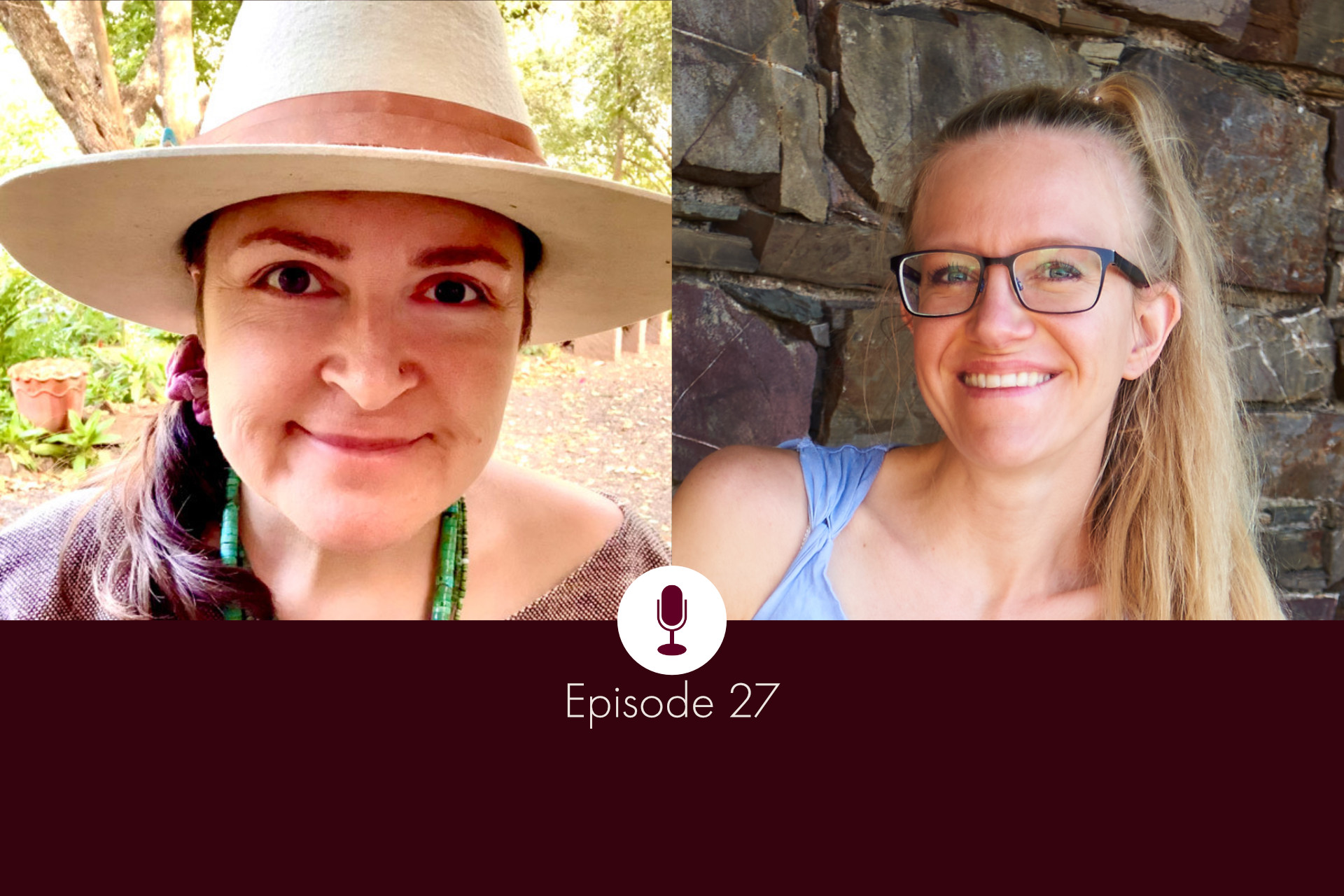
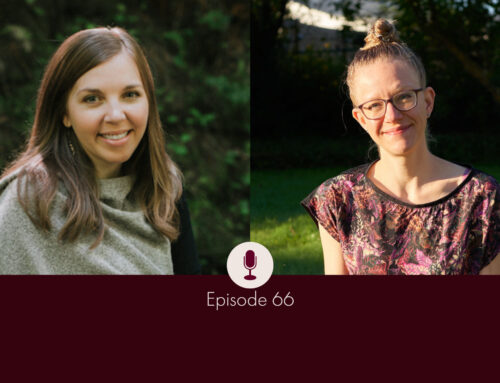
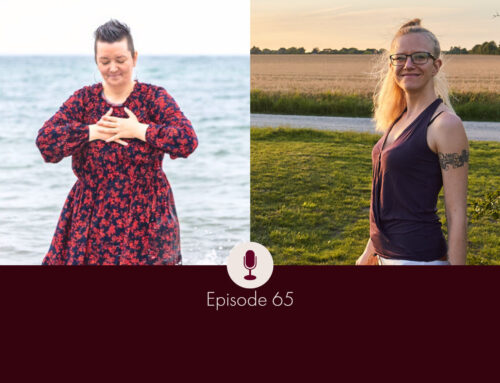
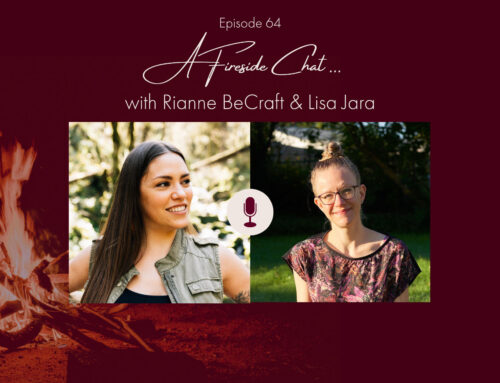
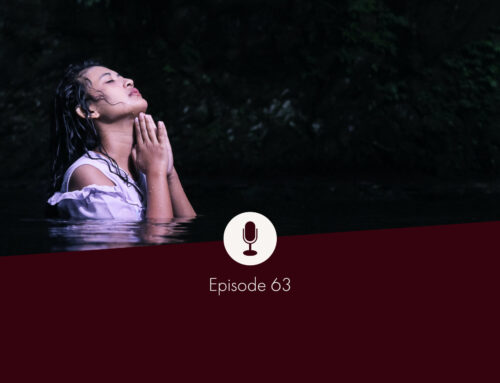
![Soothing the Inner Child to reduce Emotional Eating [Live Coaching]](https://lisa-jara.com/wp-content/uploads/2024/07/Womb-Whispers_Episode-60-Live-Coaching-Soothing-the-Inner-Child-to-reduce-Emotional-Eating_Beitrag-500x383.jpg)
